Justice Sandra Day O’Connor (1930-2023) – A Familiar Face at William & Mary Law School
United States Supreme Court Justice Sandra Day O’Connor, who died on Dec. 1, was a familiar face at William & Mary, both on main campus and at the Law School. After her retirement from the Supreme Court, she served as Chancellor of the University from 2005 to 2011 and participated in a number of Law School events.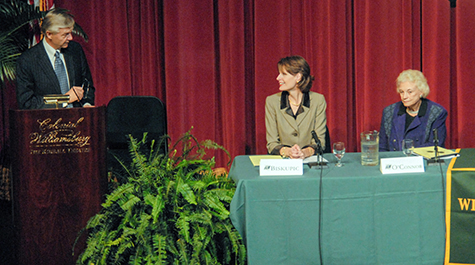
For example, during the 22nd Supreme Court Preview in 2009, O’Connor served on a panel at the DeWitt Wallace Museum’s Hennage Auditorium. O’Connor and other panelists discussed the role states play in shaping constitutional law and norms; how the Court changed during O’Connor's tenure; and whether justices should ideally retire from the Court in time to have an active post-Court life.
“I had the great privilege of hosting her several times at Institute of Bill of Rights Law events,” said Neal Devins, who since 2015 has served as the inaugural Sandra Day O’Connor Professor of Law and Professor of Government. “She was a great friend of the university and law school through her time as chancellor.”
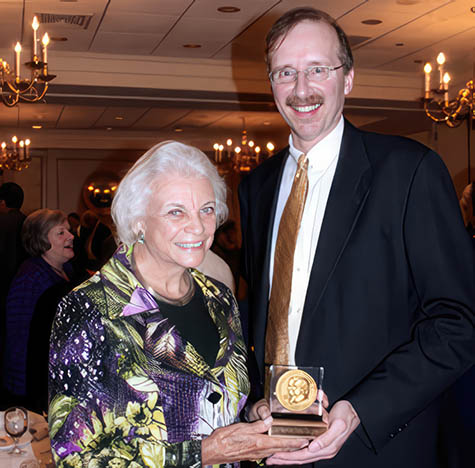 On May 14, 2010, O’Connor returned to the Law School to receive the 2009-10 Marshall-Wythe Medallion at a dinner in her honor at William & Mary's Alumni House. The medallion is the highest honor conferred by the law faculty and recognizes members of the legal community who have demonstrated exceptional leadership and accomplishment.
On May 14, 2010, O’Connor returned to the Law School to receive the 2009-10 Marshall-Wythe Medallion at a dinner in her honor at William & Mary's Alumni House. The medallion is the highest honor conferred by the law faculty and recognizes members of the legal community who have demonstrated exceptional leadership and accomplishment.
“I think we can say with some confidence, that in Justice O’Connor’s case, she has left a legacy—and is continuing to leave a legacy—that will live on for decades to come in the jurisprudence of the United States Supreme Court, in her work for judicial independence, and in her efforts to encourage civic education among our youth,” said Davison M. Douglas, Dean of the Law School as he presented her with the award.
O’Connor was next honored in 2011 during the 2011 Brigham-Kanner Property Rights Conference held in cooperation with Tsinghua University School of Law. During the event, she was presented with the 2011 Brigham-Kanner Property Rights Prize. Her contributions to property rights jurisprudence were also celebrated at a reception in her honor held at the U.S. Embassy. O’Connor’s widely cited dissenting opinion in Kelo v. City of New London (2005) has been hailed as a pivotal opinion in property law jurisprudence.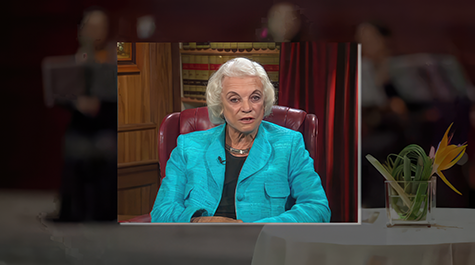
In her remarks accepting the award, O’Connor invoked the storied history of property rights in U.S. law. From Thomas Jefferson and other founders influenced by the philosophy of John Locke to modern American society today, the United States has held a special solicitude for property rights. That tradition, explained O’Connor, is more than about property—it is about people. And it embodies notions of equality and citizenship that define Americans as Americans.
O’Connor’s legacy lives on at the Law School, with Professor Devins holding the O’Connor Professorship. Established in 2011, the Professorship honors O'Connor's significant contributions to the development of a broad range or American legal doctrines through her service on the Supreme Court and supports the work of a nationally and internationally recognized legal scholar of some field of American law, including, but not limited to, American constitutional law.
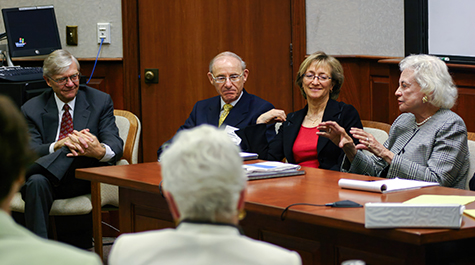 O’Connor served as an associate justice of the United States Supreme Court from 1981 to 2006. She was the first woman to serve on the Court. She became Chancellor of William & Mary following her retirement from the judiciary.
O’Connor served as an associate justice of the United States Supreme Court from 1981 to 2006. She was the first woman to serve on the Court. She became Chancellor of William & Mary following her retirement from the judiciary.
O’Connor, a native Texan, earned a B.A. in economics (magna cum laude) from Stanford University, and went on to receive an LL.B. from Stanford Law School, where she graduated third in her class.
Prior to her appointment to the Supreme Court in 1981, O’Connor had served as Deputy County Attorney of San Mateo County, California (1952-53), a civilian attorney for the Quartermaster Market Center, Frankfurt, Germany (1954-57), in private practice (1958-60), Assistant Attorney General of Arizona (1965-69), three terms in the Arizona State Senate (beginning in 1969) and as a Judge in Arizona from 1975 until her appointment to the Supreme Court. 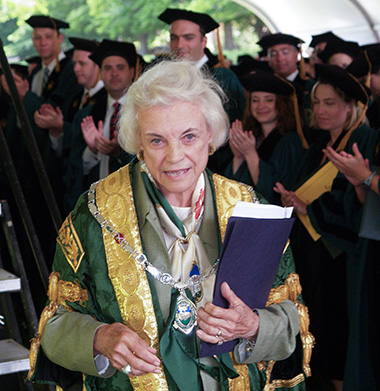
In addition to her dedication to the law and education, O’Connor was passionate about democracy. She founded two organizations that continue that legacy, the Sandra Day O’Connor Institute for American Democracy and iCivics.
Above all Justice O’Connor was a trailblazer who will not soon be forgotten.
“I was lucky enough to clerk at the Supreme Court during Justice O’Connor’s final term, so I witnessed first-hand that she was one of a kind,” said Allison Orr Larsen, Alfred Wilson & Mary I.W. Lee Professor of Law and Director of the Institute of Bill of Rights Law. “She could build coalitions while maintaining a strong sense of self, and she was a pioneer and role model for generations of female lawyers like me.”